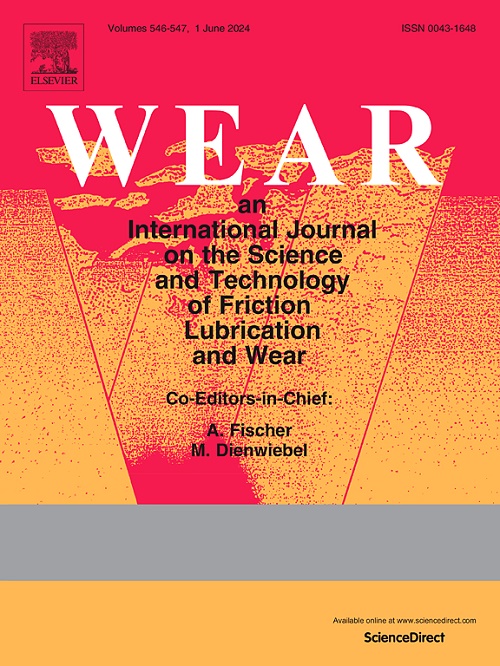Wear resistance enhancement in PTFE composites by the additive of Si3N4 nanoparticles
IF 6.1
1区 工程技术
Q1 ENGINEERING, MECHANICAL
引用次数: 0
Abstract
Polymer friction materials play a vital role in friction pendulum bearings (FPBs) but often experience premature failure due to high wear rates, significantly limiting their service life. This study developed a composite containing nanoscale silicon nitride (Si3N4) particles and microscale polytetrafluoroethylene (PTFE) powder. The tribological properties of the composite against an AISI 304 stainless steel (AISI 304 SS) counterpart were characterized using a pin-on-disc sliding tribometer. Experimental results revealed that the composite containing 5 % Si3N4 exhibited a lower friction coefficient and an ultra-low wear rate compared to pure PTFE. At a sliding velocity of 0.15 m/s and a normal load of 150 N, the wear rate of the 5 % Si3N4 composite was reduced by 95 % relative to pure PTFE. This enhancement was primarily attributed to the dispersion strengthening and load-bearing effects of Si3N4 nanoparticles, along with the formation of a more stable transfer film at the friction interface. These results underscore the potential of Si3N4 nanoparticles to significantly improve the durability of polymer friction materials in FPBs applications.
掺加氮化硅纳米颗粒增强PTFE复合材料耐磨性
聚合物摩擦材料在摩擦摆轴承(fpb)中起着至关重要的作用,但由于高磨损率,聚合物摩擦材料经常出现过早失效,严重限制了其使用寿命。本研究开发了一种含有纳米级氮化硅(Si3N4)颗粒和微级聚四氟乙烯(PTFE)粉末的复合材料。使用销盘滑动摩擦计对该复合材料与AISI 304不锈钢(AISI 304 SS)的摩擦性能进行了表征。实验结果表明,与纯PTFE相比,含5% Si3N4的复合材料具有较低的摩擦系数和超低的磨损率。当滑动速度为0.15 m/s,正常载荷为150 N时,5% Si3N4复合材料的磨损率比纯PTFE降低了95%。这种增强主要归因于Si3N4纳米颗粒的分散强化和承载作用,以及在摩擦界面形成更稳定的传递膜。这些结果强调了Si3N4纳米颗粒在fpb应用中显著提高聚合物摩擦材料耐久性的潜力。
本文章由计算机程序翻译,如有差异,请以英文原文为准。
求助全文
约1分钟内获得全文
求助全文
来源期刊

Wear
工程技术-材料科学:综合
CiteScore
8.80
自引率
8.00%
发文量
280
审稿时长
47 days
期刊介绍:
Wear journal is dedicated to the advancement of basic and applied knowledge concerning the nature of wear of materials. Broadly, topics of interest range from development of fundamental understanding of the mechanisms of wear to innovative solutions to practical engineering problems. Authors of experimental studies are expected to comment on the repeatability of the data, and whenever possible, conduct multiple measurements under similar testing conditions. Further, Wear embraces the highest standards of professional ethics, and the detection of matching content, either in written or graphical form, from other publications by the current authors or by others, may result in rejection.
 求助内容:
求助内容: 应助结果提醒方式:
应助结果提醒方式:


